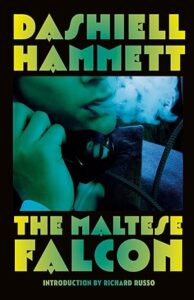| We’ve now posted a total of 17 book reviews. |
| Available now at the Amazon.com website … CLICK HERE! |
| Any and all books purchased through our website cost you nothing extra, but do help support our ongoing efforts. |
 Dashiell Hammett’s “The Maltese Falcon” is the hardboiled novel that still feels like the blueprint, a taut San Francisco thriller whose clean lines and moral thrum shaped everything from film noir to modern detective fiction. First published in 1930, it pairs a quintessential private eye with a case that begins as routine and quickly mutates into a maze of lies, leverage, and competing agendas. What strikes you first is the control: sentences trimmed to the bone, dialogue that snaps like dry kindling, and a city rendered in sharp planes—offices, apartments, hotel lobbies—where posture and word choice matter as much as clues. Dashiell Hammett’s “The Maltese Falcon” is the hardboiled novel that still feels like the blueprint, a taut San Francisco thriller whose clean lines and moral thrum shaped everything from film noir to modern detective fiction. First published in 1930, it pairs a quintessential private eye with a case that begins as routine and quickly mutates into a maze of lies, leverage, and competing agendas. What strikes you first is the control: sentences trimmed to the bone, dialogue that snaps like dry kindling, and a city rendered in sharp planes—offices, apartments, hotel lobbies—where posture and word choice matter as much as clues.
Hammett’s most audacious move is perspective. “The Maltese Falcon” uses a cool, camera-eye narration that refuses to enter its characters’ minds, forcing meaning to surface through gesture, cadence, and contradiction. The effect is cinematic without flourish: rooms described with working precision, faces read like reports, silence charged until someone blinks. San Francisco isn’t just fog and hills; it’s logistics—elevators, corridors, street corners—turned into a chessboard. The pace is brisk but unhurried, built from interviews that tighten the screws and abrupt encounters that shift the balance of power. At the center stands Sam Spade, neither knight nor knave but a professional with a personal code that’s complicated, consistent, and merciless when it needs to be. He listens, needles, and watches people arrange their own rope; he treats courtesy as a tactic and humor as armor. “The Maltese Falcon” lets him be infuriating and magnetic at once, a man who understands that in a crooked room the only way to stand straight is to find your own plumb line. His jousts with the police—wary, needling, darkly funny—double as a seminar in leverage. Around him spins one of crime fiction’s great ensembles: charming manipulators, brittle toughs, and collectors who speak in velvet while thinking in steel. Hammett gives each a distinct rhythm, then sets them orbiting a coveted object that turns want into weather. “The Maltese Falcon” is famous for its interrogations and negotiated truces—scenes that read like knife fights conducted with compliments. Information arrives in slivers: a misquoted line here, a misplaced glance there, a story told too smoothly. The book trusts you to notice, rewards you when you do, and keeps you off balance without trickery. Beneath the mechanics lies a study of appetite and principle. “The Maltese Falcon” asks what loyalty means when everyone is for sale, and what justice looks like when the cleanest option still stings. Gender and power dynamics carry the marks of their era, yet the writing’s clarity and moral bite remain startlingly fresh. The titular object is a perfect emblem—both plot engine and meditation on the stories we build around desire. New readers will find an accessible, propulsive entry into hardboiled fiction; longtime fans will hear the origin chords of a genre still playing the tune. Close the book and the aftertaste is pure Hammett: dry, unsentimental, and oddly bracing—a reminder that style is not decoration here but the straightest path to truth. |
